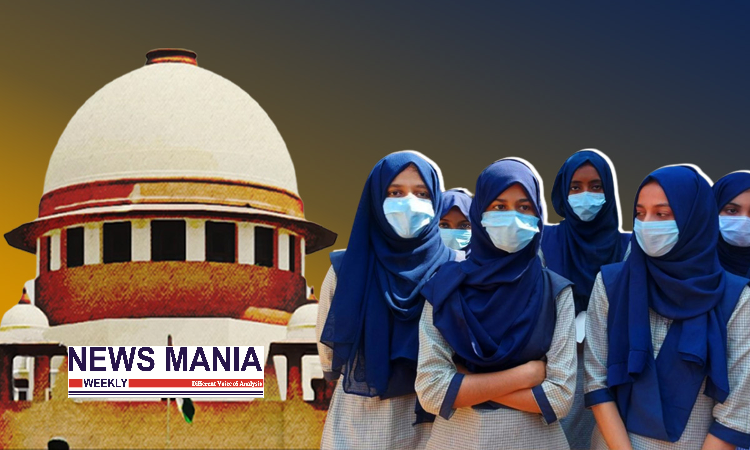Hijab Ban: Supreme Court Challenges Mumbai College Over Controversial Action

News Mania Desk/Agnibeena Ghosh/9th August 2024
The ongoing debate over the hijab ban, which initially sparked controversy in Karnataka, has now extended to Mumbai, drawing the attention of the Supreme Court. The issue arose when a college in Chembur, Mumbai, imposed a ban on students wearing burqas, hijabs, or niqabs on campus, leading to a legal challenge that has now reached the highest court in the country.
A Bench composed of Justices Sanjiv Khanna and PV Sanjay Kumar posed pointed questions to the college regarding the legitimacy and fairness of the ban. The Supreme Court issued a notice concerning the petition challenging the ban and temporarily suspended the enforcement of the ban on hijabs and caps. This move highlights the Court’s concern over the potential implications of such a ban on religious freedom and individual rights.
Justice Kumar expressed strong reservations about the college’s policy, questioning whether the ban extended to other religious symbols like the bindi or tilak, which are commonly worn by Hindu women. The Court’s line of questioning suggested a broader concern about the potential for discrimination and the selective enforcement of dress codes based on religious identity. The Bench pointed out that the college’s rules did not mention a prohibition on such symbols, raising doubts about the consistency and impartiality of the ban.
The college, in its defense, argued that allowing Muslim female students to wear hijabs could open the door for Hindu students to wear saffron shawls, potentially leading to communal tensions fueled by political elements. However, the Supreme Court emphasized that its interim order on the matter should not be misinterpreted or exploited for political purposes. The Court also granted the college the right to approach the judiciary if it observed any misuse of the order.
Justice Kumar further critiqued the college’s decision, questioning its impact on women’s empowerment. He highlighted the paradox of attempting to empower women by dictating their choice of attire, pointing out the irony of such a stance in a country that has been independent for decades. The Court’s remarks underscored the importance of allowing women the autonomy to choose their clothing, free from institutional mandates that could undermine their freedom of expression and religious practice.
The case before the Supreme Court stems from a petition challenging the Bombay High Court’s decision to uphold the college’s ban. The petition, drafted by advocate Hamza Lakdawala and filed by advocate Abiha Zaidi, argues that the ban infringes on the constitutional rights of the students, particularly their right to religious freedom and expression.
The Supreme Court’s involvement in this matter reflects the broader national debate over the intersection of religious identity, individual rights, and institutional policies. As the Court continues to deliberate on the case, its rulings will likely have significant implications not only for the students and institutions involved but also for the ongoing discourse on religious freedom and secularism in India.
The temporary suspension of the ban by the Supreme Court provides a reprieve for the students affected by the college’s policy, allowing them to continue wearing their religious attire without fear of reprimand. However, the final outcome of the case will hinge on the Court’s interpretation of the balance between religious freedom and the enforcement of institutional dress codes, a complex and contentious issue in India’s diverse and pluralistic society.






